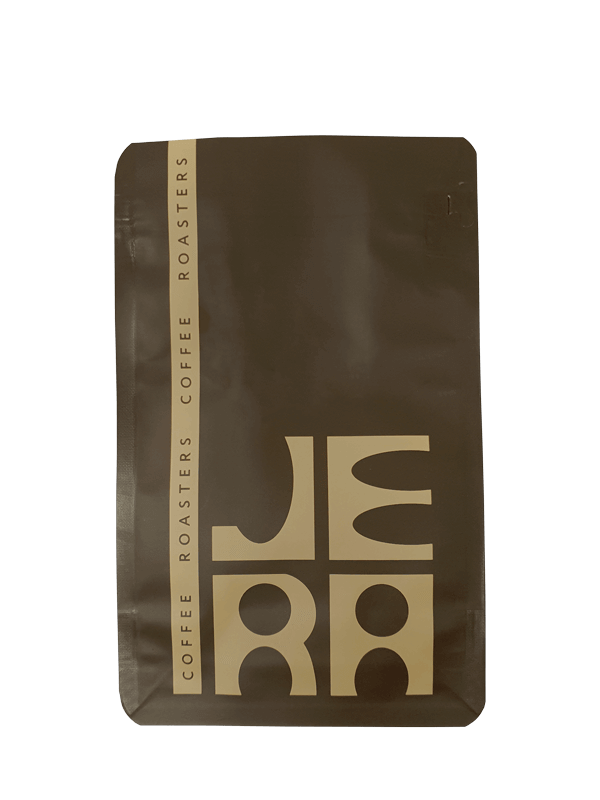קפה אתיופי | Yirgacheffe, Gedeo zine, Halo washing station
קפה אתיופי בעיבוד שטוף
קפה אתיופי קלסי בעיבוד שטוף. נקי, קליל ועסיסי. מתיקות בינונית, מרירות קלה של אשכולית, חמיצות מאוזנת הדרית וארומה פרחונית. מצוין להכנת קפה פילטר יומיומי
₪55.00 – ₪220.00
ברכישת כל סוגי קפה קלוי בסכום:
בין 600 ש"ח ל-1000 ש"ח עם קוד קופון "15%" תקבלו 15% הנחה
בין 1001 ש"ח ל-1500 ש"ח עם קוד קופון "25%" תקבלו 25% הנחה
מעל 1501 ש"ח עם קוד קופון "30%" תקבלו 30% הנחה
Ethiopia Benti Halo Washed
הקפה הזה עבר עיבוד בתחנת השטיפה היילו (Halo), תוך שימוש בדובדבני קפה שנמסרו על ידי חקלאים קטנים מהאזור. הוא סופק דרך Origin Land Coffee.
תחנת היילו ממוקמת בגובה של 2100 מטר מעל פני הים, סמוך לעיירה וורקה (Worka) באזור גדב (Gedeb). זהו אחד מאזורי הגידול הגדולים ביותר בגדב, עם שטח כולל של כ-1240 הקטאר של חוות קפה.
התחנה רוכשת דובדבנים מכ-170 חקלאים מהסביבה. גודל החוות שלהם נע בין 0.5 ל-2 הקטארים, והן נמצאות בגבהים שבין 1925 ל-2110 מטר. התחנה קרובה לחוות, כך שאף חקלאי אינו נדרש להוביל את הדובדבנים שלו במשך יותר מ-40 דקות
קפה מאתיופיה
אתיופיה נחשבת לעיתים קרובות כמקום הולדתם של הקפה המשובח ביותר בעולם. כאדמת המוצא של קפה ערביקה, המדינה מתהדרת במגוון ביולוגי שאין לו תחרות. העושר הטבעי הזה, בשילוב מסורת קפה עמוקה וטרוארים מגוונים הפרוסים ברחבי המדינה, יצרו פסיפס יוצא דופן של זני ערביקה.
בעוד ששיטת העיבוד הנפוצה ביותר באתיופיה היא עיבוד טבעי (יבש), כ-30% מהמגדלים משתמשים גם בשיטה הרטובה (שטופה). אזורים מוכרים כמו יירגצ'פה, סידאמו ולימו נחשבים לאזורי גידול הקפה הידועים והנחשבים ביותר במדינה.
אתיופיה היא מדינה ייחודית בכל הקשור לקפה. אלפי זנים פראיים של קפה גדלים כאן, ורבים מהם עדיין לא סווגו. באתיופיה התגלו לראשונה זנים ידועים כמו גיישה, רומה סודן וווש ווש.
אזורים שונים באתיופיה מייצרים קפה בטעמים ובמאפיינים שונים. לדוגמה, קפה מאזור יירגצ'פה עשוי להתאפיין בארומה פרחונית עזה עם ניחוחות של תה והדרים. קפה שטוף מאתיופיה המערבית נוטה להיות עשיר יותר, פרחוני ובעל גוף מלא. קפה בעיבוד טבעי מאזור הרר יהיה עמוק, שוקולדי ועמוס בטעמי פירות בשלים.
קפה בעיבוד רטוב
הדובדבנים נקטפים ביד וממוינים על ידי החקלאים הקטנים. בהתאם לקרבה, הם נמסרים או ישירות לתחנת השטיפה או למרכז איסוף מקומי. לעיתים הדובדבנים גם ממיינים בתחנה עצמה.
לאחר מכן, הדובדבנים מוכנסים למיכל הזנה שמחובר למקלף מסורתי מסוג Agaarde Disc Pulper. הדובדבנים זורמים מהמיכל אל המקלף, אשר מסיר את הקליפה ואת הפרי. המכונה גם מדרגת את הפולים לפי איכות – איכות ראשונה ואיכות שנייה.
לאחר הקילוף, הפולים עוברים תסיסה מתחת למים בתוך מיכלים למשך ממוצע של 72 שעות, אם כי טווח הזמן יכול לנוע בין 48 ל-100 שעות. לאחר מכן, הקפה עובר תהליך מיון נוסף בתעלות – פולים באיכות נמוכה יותר, בעלי צפיפות נמוכה, צפים ומוסרים, בעוד שהפולים הצפופים והאיכותיים נשמרים כמנות איכות גבוהות.
לבסוף, פולי הקפה עם קליפת הפרגמנט נשטפים במים נקיים ולאחר מכן מיובשים על מיטות מוגבהות למשך כ-8 עד 20 ימים. עובי שכבת הייבוש נע בין 2 ל-8 ס"מ, בהתאם לאקלים, לסוג המיטות ולשלב שבו נמצא תהליך הייבוש.
פייר טרייד (Fair Trade)
מטרת הסמכה זו היא לתמוך בתנאי עבודה ושכר הוגנים בחוות במדינות מתפתחות. באופן מסוים, היא מקדמת סחר הוגן, ולא מתייחסת רק לקפה אלא גם למוצרים נוספים. ההסמכה פופולרית במיוחד בקרב צרכנים במדינות מפותחות שבהן קיימת מודעות גבוהה יותר לצריכה מוסרית – בעיקר בארצות הברית ובצפון אירופה.
הסמכת Fair Trade מבטיחה שלא נעשה שימוש בעבודת ילדים בחוות, שעובדים מקבלים שכר הוגן, ושמתקיימים תקני בריאות ובטיחות בעבודה. הארגון מבצע בדיקות שוטפות בחוות המאושרות כדי לוודא שהן עומדות בדרישות.
Ethiopia Benti Halo Washed
This coffee was processed at the Halo Washing Station using cherries delivered by nearby smallholder farmers. It was sourced through Origin Land Coffee.
Located at an altitude of 2100 masl near Worka Town in Gedeb, Halo is one of the largest coffee-growing areas in the region, covering around 1240 hectares of coffee farms.
The station sources cherries from around 170 farmers in the area. These farmers typically operate farms ranging from 0.5 to 2 hectares, situated between 1925 and 2110 masl. Due to the washing station’s proximity, no farmer needs to transport their cherries for more than 40 minutes.
Coffee from Ethiopia
Ethiopia is often regarded as the origin of the finest coffees in the world. As the homeland of Arabica coffee, the country boasts unmatched biodiversity. This natural richness, combined with a deep-rooted coffee heritage and diverse terroirs across the country, has given rise to an extraordinary mosaic of Arabica varieties.
While the most common processing method in Ethiopia is natural (dry), about 30% of producers use the washed method as well. Renowned regions like Yirgacheffe, Sidamo, and Limu are among the most famous and celebrated coffee-growing areas in the country.
Ethiopia is a unique country when it comes to coffee
Thousands of wild coffee varieties grow here, many of which have yet to be classified. It is in Ethiopia that such famous varieties as Gesha, Rume Sudan, and Wush Wush were discovered
Different regions of Ethiopia produce very different coffees. For example, coffee from the Yirgacheffe region can have an intense floral aroma with notes of tea and citrus. Washed coffees from Western Ethiopia tend to be richer, more floral, with a fuller body. And naturally processed coffees from the Harrar region are deep, chocolatey, and full of ripe fruit flavors.
Washed Process Coffee
Cherries are handpicked and sorted by the smallholders. Depending on their location, farmers either deliver them directly to the washing station or to a nearby collection centre. In some cases, the cherries are also sorted at the station
From there, the cherries are placed in a hopper connected to a traditional Agaarde Disc Pulper. The cherries move from the hopper to the pulper, which removes their skin and pulp. The machine also performs an initial grading, separating the coffee into first- and second-quality categories.
Following pulping, the beans are fermented underwater in tanks for an average of 72 hours, though fermentation can range from 48 to 100 hours. The coffee is then further graded in channels—beans with lower density float and are removed, leaving the denser, higher-quality beans to be kept as premium lots
Finally, the parchment coffee is soaked in clean water and dried on raised beds for about 8 to 20 days. Drying thickness ranges between 2 and 8 cm, depending on the climate, table design, and drying phase.
Fair Trade
The goal of this certification is to support fair working conditions and wages on farms in developing countries. In a way, it advocates for fair trade and applies not only to coffee but also to other products. It is especially popular among consumers in developed countries with more conscious consumption habits — mainly in the U.S. and Northern Europe.
Fair Trade certification means that no child labor is used on the plantation, and workers receive fair wages while health and safety standards are maintained. The organization regularly inspects the conditions on certified farms to ensure compliance.










